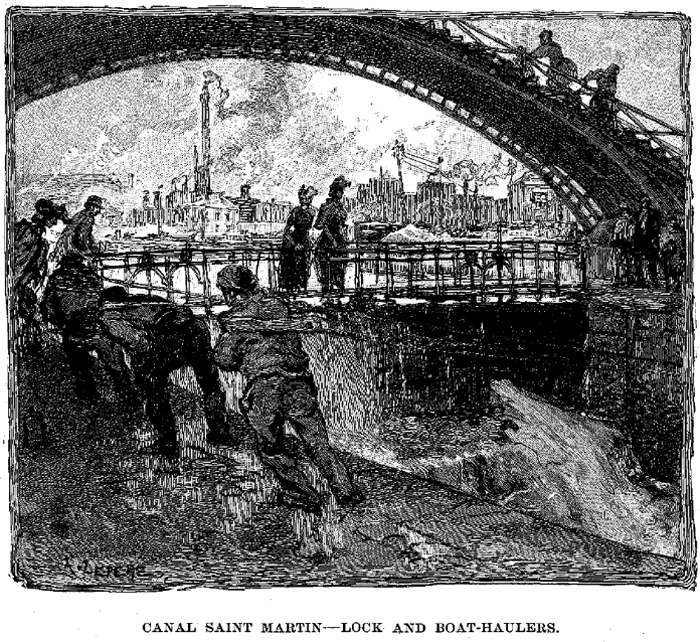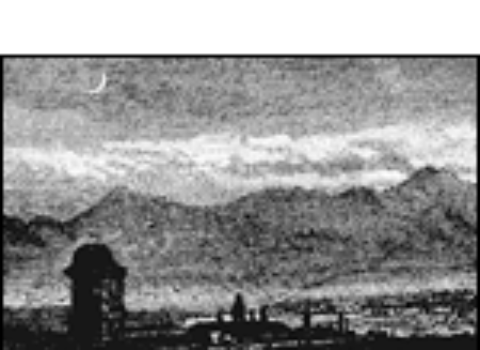Abdel’s first glimpse of the city he hoped would be his new home was of its most frantic crossroads: Paris’s Gare du Nord station. “It was pretty, actually,” Abdel remembered. “I was suddenly in France. I was proud.” Abdel, who was twenty-three years old, had come to France seeking asylum from the perpetual humanitarian crisis and dictatorship in Sudan. With nowhere to go, he wandered through the transit hub. Eventually, he found a pair of Arabic-speaking Sudanese immigrants and asked them for help. They directed him to the La Chapelle metro station.
A ten-minute walk north of the Gare, La Chapelle sits near the southeastern edge of Goutte d’Or, a traditionally working-class neighborhood and the heart of African Paris. Inside the austere station, a series of staircases leads up to a stop on one of the city’s few elevated train lines. To the south the arched windows provide a glimpse of distant Haussmannian Paris, all axial views and wide, tree-lined boulevards. The narrow, winding alleys to the north offer a stark contrast, some remnants of pre-purification cobblestone passageways still intact.
Every two minutes, La Chapelle’s raised steel tracks rumble under the weight of a passing train. Beneath the viaduct sits a barren, windswept strip of concrete. “That’s where we slept before,” Abdel told me as we exited the metro stop, when I visited him late last summer. “For months. And the metro made so much noise. So much that we could barely sleep.”
The Goutte d’Or—or “golden drop,” named for the wine produced there in the Middle Ages—is one of central Paris’s last truly working-class neighborhoods. It’s on the Boulevard de la Chapelle that readers first met Gervaise, the tragic protagonist of Émile Zola’s late nineteenth-century novel L’Assommoir (the slang title loosely translates as The Drinking Den), which fictionalized the lives of the area’s alcoholic workers, mired in poverty and despair. The book crystallized the Goutte d’Or’s reputation as seedy, poor, and dangerous, and, nearly two centuries later, in the minds of many Parisians, not much has changed.
As is often the case with areas the more fortunate shun, the neighborhood has historically been a haven for outsiders. The first wave of migration to the area was internal, as members of the rural French underclass arrived to toil in urban factories after the Revolution. Then came Italians, Portuguese, Spaniards, and Eastern Europeans, all looking for work. By the late nineteenth century, members of North and West African diasporas were settling there. Today, it offers some semblance of sanctuary to thousands fleeing war and dictatorship.
Just outside La Chapelle’s exit, street vendors hawk their wares—contraband cigarettes, roasted corn, and cheap cell phones. Nearby is the now fenced-off lot where Abdel and several hundred others spent last winter—a particularly frigid one—in tents. Though his first Parisian home was beneath the metro tracks, Abdel told me he still thinks of the La Chapelle station as a source of comfort, a place where he “could find friends . . . from Sudan, even here in France.”
His first night at La Chapelle, huddled with other refugees for warmth, the elation of having finally reached Paris helped Abdel sleep soundly. The next day, though, reality hit: he had no money, no legal status, and no winter clothes. When humanitarian workers came by with asylum applications, Abdel submitted his claim.
That was nearly a year ago. Last month, Abdel received notice that he would be able at last to testify before the immigration officials who will decide his future. If his claim is accepted, he’s hopeful he will finally get permanent housing.
Most afternoons Abdel and his friends kill time walking down Boulevard de la Chapelle, a major artery demarcating Goutte d’Or’s southern boundary. They share cigarettes and window-shop, blending in among women buying yucca root and fresh mint, men leisurely sipping espressos at one of the many café tables, and harried commuters hustling up and down the stairs to the elevated train platform.
Abdel—who asked his last name be withheld as his asylum application is ongoing—fled his country in a last-ditch effort to escape imprisonment and murder by Sudanese dictator Omar al-Bashir’s regime. He spent a year harvesting produce in civil-war-torn Libya to earn enough to pay someone to smuggle him across the sea and into Europe. When the overcrowded rubber dinghy broke down in the Mediterranean, he thought his life was over.
“No one intended to survive,” Abdel told me one day in the neighborhood over lunch at a tiny Sudanese restaurant tucked behind La Chapelle. As we spoke he dipped hunks of baguette into a tureen of foul, a cheap bean dish that for him tastes like home. “I was incredibly scared. Everyone was scared. No one talked to anyone but God.” The Italian navy ultimately rescued him and dropped him off in Sicily. He then evaded a series of border controls in order to reach Paris, hoping the French he had learned as a child at a cultural center in Khartoum would work in his favor.
Abdel’s story is, unfortunately, hardly unique. As of October, nearly 1.5 million individuals have formally sought asylum in the European Union. Many others, like Abdel, are still waiting on applications that seem perennially stalled. The situation show no signs of improvement; conflicts in places like Syria, Iraq, Afghanistan, Eritrea, Ethiopia, Somalia, Sudan, and South Sudan are ongoing.
“Before the war, we were happy,” Abdel said, as he signaled to the waiter for more bread. “I was with all my brothers, my sisters, together. We were happy. We went to school; we would read the Koran at home,” he continued. “We didn’t know it would all disappear.”
Abdel lived at La Chapelle until June, when Paris police evacuated the camp, which had been there since the summer of 2014, citing public health issues. The police “came so early in the morning. They made a circle, and they said no one can leave,” Abdel explained. “They put people in their cars, their buses. But I wasn’t there.” He wishes he had been; then he might have been bussed to temporary housing. But he had woken before dawn that day and gone for a walk in the Goutte d’Or. When he returned, his camp, along with many of his friends, was gone.
France ostensibly guarantees shelter to those who have submitted applications for formal refugee status, but for many, like Abdel, that promise has remained hypothetical. Housing shortages, a lack of personnel to process applications, and complicated bureaucracy prevent many asylum seekers from accessing their rights.
For two long months after the evacuation, Abdel lived his days not knowing where he would sleep when night fell. Occasionally he crashed with friends lucky enough to already have housing; other times he squatted in train station lobbies. When I first met him in August, he—along with approximately 200 other asylum seekers—had found temporary shelter within the crumbling walls of an abandoned school. Tattered blankets lay atop makeshift cardboard mattresses, lined in rows on the cold tile floor of the vacant classrooms. Outside, the asphalt courtyard reverberated with bouncing basketballs. Some men sat on broken-down boxes, playing cards.
At one of our meetings at the school, Abdel introduced me to his new friend Khaled, who had arrived two days earlier from Sudan after a journey across the Sahara and the Mediterranean as harrowing as Abdel’s own. Khaled carried a box of cookies he found in the school’s makeshift kitchen, which was stocked with donated goods. The linzer tortes were wrapped in a flyer featuring a quote from Bernard Cazeneuve, France’s interior minister, about protecting the oppressed. Beneath the text there was a photo of a man lying on the streets, bleeding, a policeman’s boot inches from his face.
Abdel and Khaled decided to head back to La Chapelle in search of a cheap cell phone. As we walked to the metro, Khaled explained why he left his country. “I’m not poor,” he says in broken English, “but my government is not good.” He paused so we could go through the turnstile. I swiped my ticket, and the two young men jumped over the barrier after me. “If you talk, the government kills you,” Khaled continued. “You don’t have the ability to speak for freedom. You can’t talk about anything.”
The metro halted at La Chapelle, and as we descended from the elevated platform, Abdel pointed to several policemen frisking a young black man. “Look, the policemen—they’re in the middle of inspecting blacks,” he said, shaking his head. “And there’s all the whites over there. There’s such segregation and racism in this country.” Throwing his hands up as we exited the station, he added, “Are there any white people getting inspected? There’s none.”
In large part because of its colonial heritage, France is reputed to be one of Europe’s most multicultural and multiracial countries; it’s also plagued by xenophobia and inequality—evidence of which is more than anecdotal. A recent study found that black people in Paris are, on average, six times more likely to be checked by police than white people; those who appear to be Arabs are stopped nearly eight times as often.
After Khaled purchased his phone, we headed to a café on the corner. Two elderly men sidled up next to us, and we realized we were standing in front of their beers. Abdel and Khaled were uneasy with the thought of being in someone’s way; both quietly looked down into their coffees before shifting to the side and exchanging a few words in their native Arabic. Abdel looked back up as he started pouring sugar in his cup. “It was their place; they were first,” he said to us, looking over at the men. “And they’re elderly, you have to respect them.”
Before we parted ways at La Chapelle, I asked Abdel if he envisions ever returning to Sudan. “I love my country,” he said, “but I love my life more.” For those of little means, there’s nothing easy about existence in Paris—Zola’s destitute Gervaise meets her untimely end in the Goutte d’Or, dying not of cold or hunger but of “utter weariness of life.” It’s a sentiment asylum seekers like Abdel know all too well.
“It’s true, we’re screwed right now,” Abdel said. “But we’ve got to persist. I’ve dealt with it for years because I have to. I have to. Because I don’t know where to go. I can’t go to Sudan. I’ve got to keep going.” If he receives legal refugee status, he hopes to start a family—and a new life—in France. If he doesn’t? “I’ll make a plan B.”





